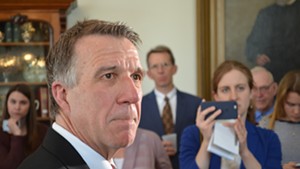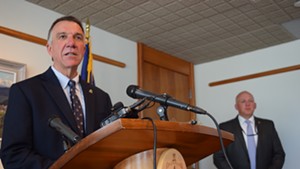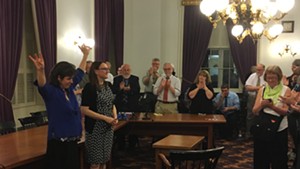
- Terri Hallenbeck
- Senate President Pro Tempore Tim Ashe (left) and House Speaker Mitzi Johnson at a press conference last Wednesday.
It was a tense and exhausting finish last week to a low-key session of the Vermont legislature. Gov. Phil Scott's belated introduction of a plan to change how public school teachers negotiate health insurance benefits put the session into overdrive. Republican governor and Democratic legislature traded proposals, offers, accusations and recriminations until the very end, before declaring failure. Reluctantly, with regret.
"We were very, very close to a deal," said House Speaker Mitzi Johnson (D-South Hero). The governor agreed, calling it "frustrating on both sides."
Lawmakers quickly passed all remaining legislation and adjourned early Friday morning, with Scott promising to veto two key bills. One is the annual measure that helps set property tax rates and includes a version of the teacher health care proposal. The other is nothing much to worry about — just the state's entire budget.
Yes, we're headed for overtime, again. If the promised vetoes happen, the legislature will return on June 21 with a looming deadline: If Vermont doesn't have a budget by July 1, state government could be forced to shut down.
So how did we get here?
Go back to April 25, when the legislature was two weeks from scheduled adjournment. That's when the governor formally put his weight behind an idea that had been kicking around Montpelier for months. Due to a provision in the federal Affordable Care Act, all teacher health care plans will be changing at the end of this year. The transition will save tens of millions of dollars in premium payments.
Scott proposed that health insurance be negotiated statewide, rather than school district by district. It was the best way, he said, to maximize the savings.
Democrats objected to the belated introduction, because it precluded full legislative vetting. They also joined the Vermont-National Education Association in balking at the change in the collective bargaining process.
Since then, there have been closed-door meetings, press conferences, press releases and trial balloons aplenty. But no matter how close the parties came to a deal, one issue remained.
"The ultimate sticking point is ensuring that there's a mechanism to achieve the savings," said Scott spokesperson Rebecca Kelley. "That's where all of the proposals and counterproposals have boiled down."
Democrats floated various plans, but they stood firm on one principle. "The one thing our caucus couldn't do was interfere in the process happening right now," Johnson said, referring to ongoing collective bargaining.
Scott offered ideas for keeping health care talks at the local level, but always with a "mechanism to achieve the savings." To Democrats, all of his plans intruded on collective bargaining. The two sides gradually drew closer, but days turned into weeks and a grand bargain proved elusive.
Last Wednesday, Johnson and Senate President Pro Tempore Tim Ashe (D/P-Chittenden) held a press conference at which Johnson declared an "impasse" with the governor.
But while the two leaders appeared to signal a standoff, they weren't ruling out further talks with the governor. In the meantime, lawmakers went to work putting the finishing touches on key legislation and setting the stage for adjournment.
Which brings us to last Thursday morning. Five people gathered in the governor's ceremonial office: Scott, Ashe, Johnson and the legislature's two "deans" — the senior members of each chamber, Sen. Dick Mazza (D-Grand Isle) and Rep. Alice Emmons (D-Springfield).
Their first meeting was a sort of icebreaker.
"The discussion in the morning was very cordial," recalled Ashe. "It was putting all the different themes on the table and having a general discussion about whether we could see new opportunities." Ashe characterized it as "a positive discussion" — promising enough to warrant additional meetings.
At a subsequent meeting Thursday afternoon, the parties made significant progress. But different people recall the outcome differently.
"We had a framework in terms of what we could agree on," recalled Emmons, "and we had to bring that back to our respective caucuses and our respective bodies."
Not quite, according to Kelley. "There was a framework," she said, "[but] I wouldn't say we all agreed on a plan. It was more, there was this one piece, and let's go back and see how our teams feel about this one piece."
Citing ongoing negotiations, Kelley would not reveal the exact nature of the "piece." But it has to do with the governor's insistence on that darn mechanism.
"Every step of the way, it seemed to come back to — we couldn't get beyond that line in the sand, so to speak," she explained, sort of.
Ashe and Johnson left the meeting believing they had what the speaker called "the parameters" of a final agreement. Their task was to sell it to their respective chambers.
"It took some explaining and talking," recalled Johnson, "but the House and Senate came back and said, 'We can do this. We're ready.'"
The five negotiators reassembled in the early evening. For Ashe and Johnson, what followed was a disappointment bordering on betrayal. "He put something else on the table," Johnson asserted in a Friday conference call with reporters, referring to Scott. She didn't specify what she meant by "something else."
Mazza, nominally a Democrat but a firm ally of the governor, doesn't believe that Scott did any such thing. "He's always been firm on what he was asking for," Mazza said. "I don't think he was being unreasonable."
In any case, that was it. No agreement, just a final rush of lawmaking and a late-night adjournment, overshadowed by Scott's veto promise.
And now, the real fun begins.
Sometime before June 21, negotiations will resume — with no reporters present, of course. Outside the Statehouse, lobbying and organizing is likely to outpace anything that happened before April 25. Unions and left-wing advocacy groups were blindsided by Scott's proposal. Now they're gearing up for a fight.
"To be honest, I think people were a little shocked because [Scott's plan] was so late in the game," said Conor Casey, executive director of the Vermont Democratic Party. "I think that was part of the strategy. But by dragging out a veto here, I believe groups will become increasingly engaged, and he will experience pressure that he hasn't experienced to this point."
That pressure began with a May 16 press conference with a phalanx of labor leaders standing firm behind the teachers — including the Vermont Troopers Association, which endorsed Scott in 2016. The next day brought hundreds of teachers and supporters to a rally on the Statehouse steps. Not a bad turnout on a Wednesday afternoon.
The teacher health care issue has been a political winner for the governor, with its bumper-sticker-ready simplicity. So far, Democrats have struggled with multiple messages that don't resonate with the public. Now, they see an opening.
"Gov. Scott is starting to develop a record," observed Casey. "He's beginning to define himself, and people who voted for him on the premise of being a moderate politician, they see that this doesn't fit in with his nice-guy image."
Casey is fond of tying Scott to very conservative governors in other states. At last week's union rally, he brandished a sign that read "Governor Scott ... Walker?"
It may seem a stretch to tie Phil Scott to the man who turned Wisconsin from a union stronghold to a right-to-work state. But Casey and his union allies see Scott's teacher health care proposal as the thin end of the wedge.
And there's evidence to back up that assertion. In a response to a Vermont State Employees' Association questionnaire last summer, candidate Scott wrote this: "I am supportive of collective bargaining rights ... I do believe, however, that every individual has a fundamental right to decline to join or participate in any organization with which she/he does not wish to participate in."
Which is the very definition of "right to work."
Democrats may see a chink in the gubernatorial Teflon, but Scott remains very popular, and any 2018 challenger faces an uphill climb. Republicans are looking forward to a Scott victory tour next year and hoping to gain ground in the legislature and mount a challenge to Lt. Gov. David Zuckerman. But, for the first time since Scott's easy victory last November, the Dems are feeling a bit of hope.
"I've seen people step out of the woodwork who've been pretty quiet to this point," Casey said. "The common wisdom in Vermont is that the incumbent is unbeatable. But what the governor has done is declare war on many of the groups who supported him in the previous election."
The Democratic Party won't shy away from the union label. In fact, on Saturday the party's state committee elected VT-NEA president Martha Allen to its executive committee. Also on that 15-member panel: VT-NEA executive director Jeff Fannon.
Two seats for one union. Too much?
Not for Casey.
"We are the party of working people — union and nonunion alike," he said.
Vermont Republicans don't mind hearing that kind of talk. In recent weeks, they have depicted Democrats as the bought-and-paid-for lackeys of the VT-NEA. In a recent press release, Vermont Republican Party executive director Jeff Bartley slammed legislative leadership as being "more interested in pleasing the VT-NEA and other special interest groups ... than they are in doing what is best for all Vermonters."
Whether he intends it this way or not, the governor's veto will be the opening gambit of the 2018 campaign. Both sides are eager for the battle.
Flack Track
Congressman Peter Welch (D-Vt.) has hired a new press secretary to replace the departing Kirsten Hartman, who is going to work for Sen. Amy Klobuchar (D-Minn.).
"It's been a wild two years working for Peter," Hartman said in an email announcing her move. "It's been a gift to work for such a 'happy warrior.'"
Taking over for Hartman is Middlebury College alum Kate Hamilton. She joins the Welch office from Washington, D.C.-based media firm GMMB where she worked on the Hillary for America advertising team and for the Democratic National Convention.
"I loved feeling like I was in the middle of things," said Hamilton, who interned for Welch in 2010 and 2011. "After the election, I felt like I wanted to move over to Capitol Hill, because it felt more central to what was going on."
Hamilton was born in Washington, D.C., to a journalistic power couple: Jane Mayer, staff writer for the New Yorker who reported for the Rutland Herald early in her career, and Bill Hamilton, Washington editor for the New York Times.
Did their profession influence their daughter's decision to enter public service? "Yeah," she said, "or perhaps a Freudian element, going from journalists to trying to shape messaging."
Ah, to the dark side she has gone. We will watch her career with great interest.
Disclosure: Tim Ashe is the domestic partner of Seven Days publisher and coeditor Paula Routly. Find our conflict-of-interest policy here: sevendaysvt.com/disclosure.















Comments (2)
Showing 1-2 of 2
Comments are closed.
From 2014-2020, Seven Days allowed readers to comment on all stories posted on our website. While we've appreciated the suggestions and insights, right now Seven Days is prioritizing our core mission — producing high-quality, responsible local journalism — over moderating online debates between readers.
To criticize, correct or praise our reporting, please send us a letter to the editor or send us a tip. We’ll check it out and report the results.
Online comments may return when we have better tech tools for managing them. Thanks for reading.